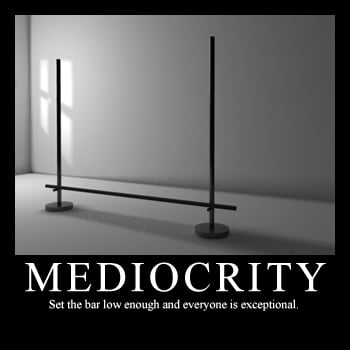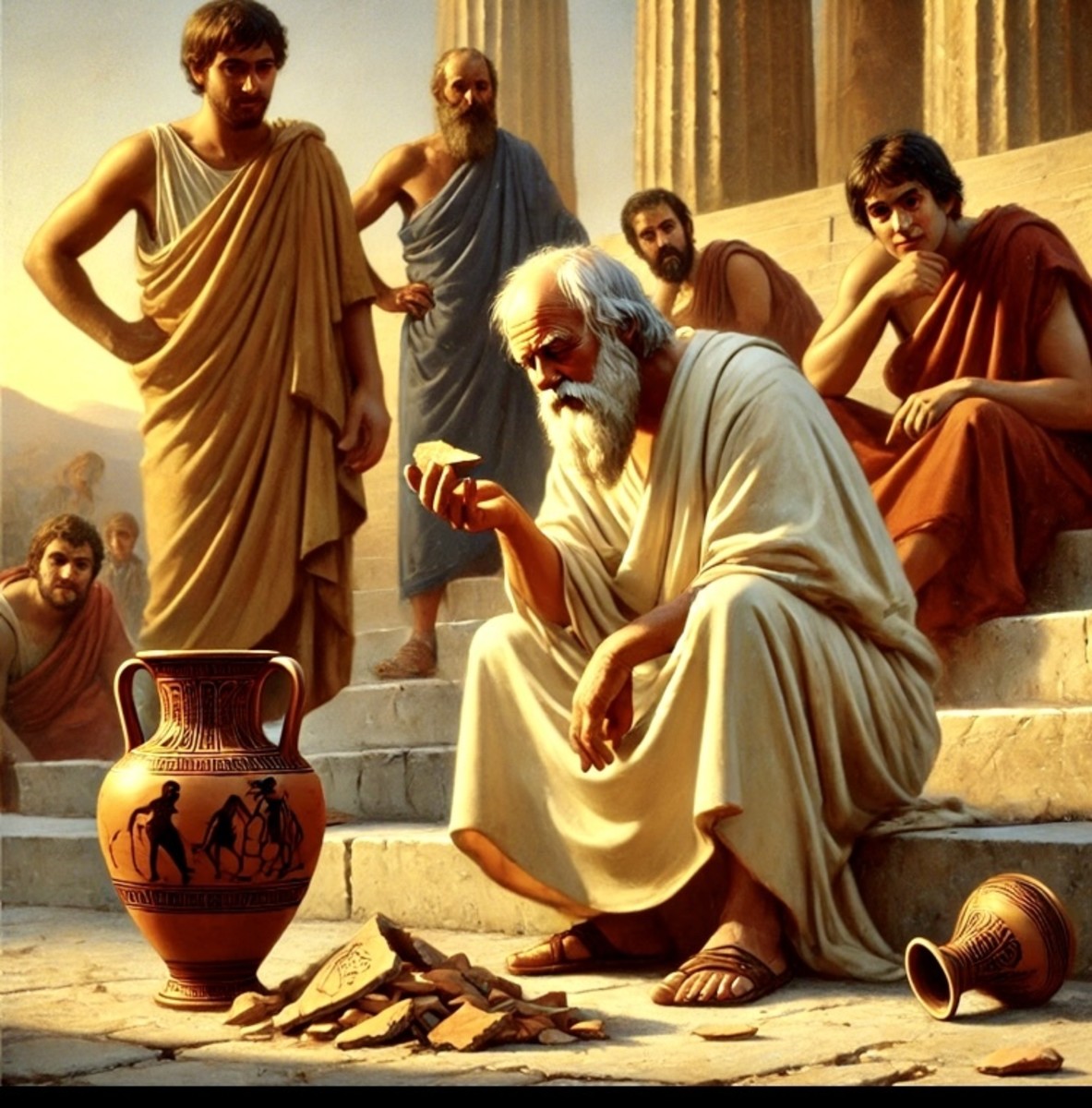The Rise of Mediocrity

and the Decline of Greatness
I am a very competitive person. I have been as long as I can remember. I grew up surrounded by the philosophy that one should constantly strive to better himself, regardless of the activity. To become better, one must gauge himself against what others do, or can do. With me, I just have to be the best at what I do. I may not always succeed, but I will never give up trying. I have to rise above everyone else. I have to raise and meet that bar every time. In fact, this saying pops into my head everyday, and to me, it is the very definition of competition, "I am better than you, and I can prove it."
Now, one might say that there are some deep psychological issues to which I cling. There could be accusations of "low self-esteem" and that I am overcompensating for some kind of shortcoming. That is fine. People may say whatever they like, but in my opinion, every single person has a set of values that were created by his upbringing. My parents, teachers, peers and others around me valued the pursuit of being better. In my mind, I do not "suffer" from low self-esteem. I just have a burning desire to be better than what I am, and what others are.
Unfortunately, I have seen a decline of greatness and the rise of mediocrity. So many times, I have seen parents, teachers and youth activity organizers coddle children and enforce in them the belief that everything less than great is just as good as great. Nowadays, even last place finishers get a ribbon and/or trophy. Over and over, I hear the saying, "There are no losers. Everyone is a winner." If this is the case, there should be no sporting events, no tournaments and no competition whatsoever. If everyone is a winner, where is the feeling of accomplishment? Where is the sense of pride? Why play, work or engage in anything at all? Why don't we just give Olympic gold medals and Super Bowl championship rings to every person that wants one? Because it takes more than just desire or participating. It takes the talents and skills to rise above the rest and win.
I remember one of my own examples. My third grade teacher tried to give me an award for perfect attendance, but I knew that I had missed school on two occasions that year. The first was for my family taking an early weekend trip to Walt Disney World. We left Thursday evening in order to be rested for a visit to the Magic Kingdom first thing Friday morning. I did not want to go early because of the chance to get perfect attendance at school, but I was 8 years old, and my parents won that argument. The second absence was due to taking my godfather to the airport so he could fly back home after a two-week visit with us. That was a Tuesday. Since my perfect attendance record was already shot, I did not bother to resist. We ended up going to the Museum of Science and Industry (MOSI) in Tampa afterwards. For this nerd, that was just the best day ever. In the end, my teacher still tried to give me an award, but still, I refused, because I had not earned it. Even at that young age, I knew mediocrity was not worthy of accolades. It just was not right.
Another example from my life came three years later when I was in sixth grade. My Physical Education (PE) teacher asked me to be on the school's track and field team. I learned the long jump, high jump and baton passing in order to run in a relay race. When the day of the meet came, I was entered in the long jump, high jump, 220 yard (now 200m) race and the 880 yard (800m) relay race as the anchor. I disqualified myself in the long jump with line violations. I finished 6th out of 9 or 10 for the high jump. I finished last out of 8 for the 220, and my team finished 6th out of 8 in the 880 relay. I did not receive any medals, ribbons or any other type of reward. I did not earn them. Yes, I was disappointed in myself. I put all of me into those events. I did the very best I could do, and I came up short. However, I did not cry. I did not pout. I did not whine about not getting a trophy or anything. I completely understood why, and I accepted that "why". My performance was mediocre, but I did not accept that mediocrity. It reminded me that my best needed to be better.
I did not just keep this attitude with academics and athletics. As an adult, I took this mindset into my professional life as well. I used to work with a team of guys that collected logistical data for combat systems on-board aircraft carriers. Sometimes, the data would be kicked back because of obvious errors, or we would have to answer questions about continuity in system diagrams and power supplies. My drive to be competitive had me asking questions of my supervisor of who had the least errors. He said he did not keep a record of those things, but still I was curious. After about a year on the job, my supervisor told me that he received a call from the office that put our data together to create a point-and-click computer program for the sailors to use while at sea. He told me that the other office said that three of my packages were "as perfect as humanly possible and some of the best work produced in the history of the project". YEAH!!! That is what I am talking about. Not only was it great work, it was perfect. With this type of desire to be great at my job, I was rewarded by becoming the supervisor of a much larger team, which I helped put together. This meant training them, checking their work and growing the project to more than just combat systems or even aircraft carriers. It also meant that my office took on more project control. By one person displaying a drive to be better, to become great, the company as a whole grew, expanded and became more profitable. Or at least I like to see it that way sometimes.
So, why are we not teaching our children and grandchildren these kinds of standards and values? Why is "mediocre" rewarded and praised? Why are the Kardashian girls famous? What talents do they possess? How are they bettering the lives for the rest of society? Also, why are we so impressed with the contestants (notice that I did not say "competitors") of "American Idol"? To me, they are nothing more than a face and a voice. There is no real talent there. Is this what we want to teach our youth? Is it totally okay to do something half-way and be rewarded with the same awards as those that truly rise above the rest? I say no. No one should receive a prize just for showing up. To me, that is not a prize. It is a meaningless and worthless handout. If we do not value greatness, what can we value?
Even the great people of the past are now being vilified. Every time I turn around, there is another great person from history being torn down and defamed because he or she was not absolutely perfect. Lewis Carroll was a great storyteller and imaginative enough to come up with new words, but because he kept company with little girls, he was accused, after his death, of being a pervert, or worse, a pedophile. No one had any evidence to back up these claims. There were even some that knew and proved that he did not molest or sexually abuse children, but in today's society, we do not seem to care about that proof, just the accusation is enough to lower one's estimation of another. I have also seen articles to paint others in a bad light, including our own founding fathers, men who had the courage to fight for and the wisdom to articulately construct a new nation. It seems that it is not fair to not reward losers but it is fair to destroy the reputation of person that is long dead and unable to defend himself. Are these attempts at rewriting history supposed to help us feel better about ourselves? Should we take pride in being shallow and inhumane? If so, we should be ashamed. Deeply ashamed.
I just cannot see why we should lower the standards for ourselves, our nation and our species. I firmly believe that we should continue to strive to be better. We should no longer accept mediocre performances, let alone reward it. We should be building incentives to recognize greatness. We need to stop tearing down those that truly are great. Because, to me, the one that tears another down like that is the one with low self-esteem, not the one that competes, not the one that says, "I can be better, and I can prove it." Americans, and other people, can be better, and I intend to prove it. It is time to raise the bar and accept nothing less.
© 2012 Charles Dawson








